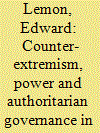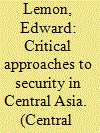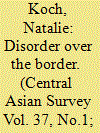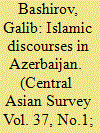|
|
|
Sort Order |
|
|
|
Items / Page
|
|
|
|
|
|
|
| Srl | Item |
| 1 |
ID:
159221


|
|
|
|
|
| Summary/Abstract |
Counter-extremism has become an important tool for the authoritarian government of Tajikistan to consolidate its position. In this article, we argue that counter-extremism is not purely about destructive acts, such as banning groups or arresting individuals: it is productive, too. Using a Foucauldian understanding of disciplinary power and biopower, we argue that counter-extremism in Tajikistan is an attempt to produce secular, docile citizen subjects who are resistant to extremist ideas. Using ethnography and discourse analysis, we focus on the way in which these practices are gendered, targeting the bodies of those deemed ‘dangerous’. Counter-extremism, we argue, is exercised not only by the state but also by citizens, who monitor themselves and others for signs of radicalization. Although some support state secularism, most merely accept it. A smaller group resist practices that target certain forms of religious belief and practice. We explore these everyday forms of resistance against disciplinary power and biopower.
|
|
|
|
|
|
|
|
|
|
|
|
|
|
|
|
| 2 |
ID:
159213


|
|
|
| 3 |
ID:
159214


|
|
|
|
|
| Summary/Abstract |
Across Eurasia, authoritarian leaders have sought to justify their ‘strong-hand’ approach to government by framing instability as a security threat and the strong state as a guarantor of political stability. Such ‘regimes of certainty’ promote a modernist valorization of order, the flip side of which is a demonization of political disorder instability, or mere uncertainty. Examining the spatial and temporal imaginaries underpinning such narratives about in/stability in Central Asia, this paper compares official discourse in Kazakhstan and Uzbekistan, where state-controlled media and official publications have stigmatized political instability in Kyrgyzstan as indicative of the dangers of political liberalization and a weak state. Ostensibly about the ‘other’, these narratives are also about scripting the ‘self’. I argue that official interpretations of ‘disorder over the border’ in Kyrgyzstan are underpinned by a set of spatial and temporal imaginaries that do not merely reflect regional moral geographies, but actively construct them.
|
|
|
|
|
|
|
|
|
|
|
|
|
|
|
|
| 4 |
ID:
159215


|
|
|
|
|
| Summary/Abstract |
This article captures the dynamics of the securitization process through which new Islamic movements were constructed as an existential threat in Azerbaijan. After mapping out various competing discourses on Islam that emerged in the post-independence period, I discuss, using insights from the post-structuralist approach to securitization theory, the process of securitization of these movements. First I discuss the construction, by the hegemonic discourses, of a uniform identity category of ‘non-traditional religious movements’, and representation of otherwise different religious groups and organizations within this much stigmatized category. Later I show how the movements were constituted as an existential threat to national security and national identity through forging chains of associations between these groups and instability, chaos, social degeneration and terror. In the final section, I show how the securitizing discourse found expressions in emergency measures that were designed to deal with the movements and confirm their identity as dangerous other.
|
|
|
|
|
|
|
|
|
|
|
|
|
|
|
|
| 5 |
ID:
159220


|
|
|
|
|
| Summary/Abstract |
This article explores the intersections of theory and community knowledge, experiences and imagination to illustrate how Kyrgyzstan’s informal settlements contest both normative politics and current global security practices. Instead of viewing informal settlements or the Kyrgyzstani state as disparate objects on and by which security is respectively imposed and enacted, how security differences are pronounced, circulated, resisted and reformulated through Rancièrian politics is examined. In this process, the Kyrgyz community-relational concept of yntymak is brought forth as a vital practice of organization and place-making in and against adversarial attempts at governance. Reconfiguring politics around specific community practices exposes the utilitarian shortcomings of neoliberal governance methods and typical conceptions of security.
|
|
|
|
|
|
|
|
|
|
|
|
|
|
|
|
| 6 |
ID:
159217


|
|
|
|
|
| Summary/Abstract |
Imaginations of existential threat do not only express themselves in exceptional actions – as prominently suggested by securitization theory – but also in routine, day-to-day practices. They can become a part of ‘normal’ life. We demonstrate this by following the everyday activities of individuals from the Lyuli as well as the lesbian, gay, bisexual and transgender (LGBT) community in Kyrgyzstan. Individuals from both groups actively and consciously secure themselves by employing a mix of practices that range from deterrence and open confrontation to avoidance, adaptation and hiding tactics. For the purpose of tracing and discussing these activities, our article develops and applies the innovative concept of securityscapes.
|
|
|
|
|
|
|
|
|
|
|
|
|
|
|
|
| 7 |
ID:
159219


|
|
|
|
|
| Summary/Abstract |
Much security-related research conducted in Central Asia appears to disregard the nexus between the data gathered and participants’ and researchers’ experiences of safety during the research. This article explores the interconnectedness of these factors and their effects on the knowledge produced on security. It investigates the legal and institutional context researchers encounter when conducting research in Kyrgyzstan; namely, a state monopoly over knowledge on certain subject matters linked to political stability and security. Furthermore, drawing on the combined fieldwork experience of the authors, the article explores the roles of cooperation, networks and framing in navigating the security implications of doing research. To conclude, we suggest a long-term and collaborative production of knowledge on security in Central Asia to counter the prevailing modes of knowledge production which lean towards epistemically violent and politically provocative topics.
|
|
|
|
|
|
|
|
|
|
|
|
|
|
|
|
| 8 |
ID:
159218


|
|
|
|
|
| Summary/Abstract |
Based on anthropological fieldwork conducted in the Xinjiang Uyghur Autonomous Region in China in 2016 and 2017, this article addresses the meanings of security from subjective perspectives by investigating Uyghur perceptions of marriage, which offer crucial insight into the meanings of security. The Uyghurs, as the major indigenous population in Xinjiang, have encountered securitization, particularly since the 2009 Ürümchi riots, deemed the worst ethnic conflict in the region since 1949. While official security practices based on stability have won the support of most Han Chinese citizens in and outside Xinjiang, these same security practices have penetrated to and influenced intimate Uyghur life, such as marriage. Uyghur participants in this research indicate that marriage is a social field in which the official counter-extremism campaign, individuals’ happiness (bext), and the security (bixeterlik) of the Uyghur collective identity encounter and negotiate with each other.
|
|
|
|
|
|
|
|
|
|
|
|
|
|
|
|
| 9 |
ID:
159216


|
|
|
|
|
| Summary/Abstract |
Discussions generated in Russian and Western academic, policy-making and media circles by recent terrorist attacks in the Middle Volga and Urals (İdel-Ural) derive primarily from hegemonic state discourses and as such miss the wealth of discussion generated in local-language sources about the causes and implications of these attacks. The goal of this study is to provide an examination of the various perspectives concerning terrorism in the region, focusing on the level of Tatar (and secondarily Russian) society. Employing insights from a recent body of literature on ‘everyday’ and ‘vernacular’ (in)securities as well as on conspiracy theories, I examine Tatar-language Internet forums posted on the Radio Free Europe website related to the terror events of July 2012. I detect no incitement to violence among the Tatar-speaking participants. However, my results suggest that Tatar publics use diverse interpretive repertoires to make sense of a securitizing reality. The study suggests that Tatar-speaking publics depart in important ways from the dominant narrative of the ‘police’ order as well as from the Weltanschauung of their Russian-speaking compatriots.
|
|
|
|
|
|
|
|
|
|
|
|
|
|
|
|
|
|
|
|
|